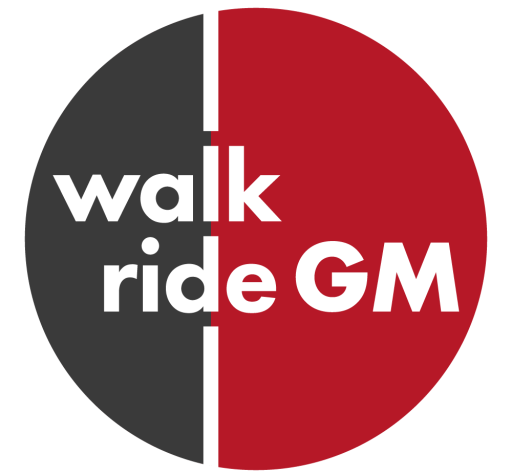and other antisocial parking / stopping / unloading
- Lines and Signs – Contact the local Council
- Obstruction/danger – Greater Manchester Police
- Pavement parking is not yet illegal in Greater Manchester, unless there are single or double yellow lines (enforceable by the council) or the footway is completely blocked obstructing safe access (police).
Background
One of the most common complaints of our members is motor vehicles taking up even more of our public space by parking on pavements and cycle lanes. It’s become an everyday occurrence to see parked cars completely obstructing access, forcing pedestrians to step into the road to get past. It’s unfair, often dangerous, and disproportionately affects vulnerable road users including disabled people and parents with prams.
Unfortunately there is no law in most of England and Wales preventing drivers from parking on the pavement. It is technically illegal to drive on the pavement – so every pavement-parking driver has broken the law to get there – but in practice this rule is not enforced.
Scotland and London are exceptions; parking on pavements has been illegal in London since Parliament passed the Greater London Council (General Powers) Act 1974. The Scottish government passed a similar Act in 2019, and local authorities across Scotland have been allowed to enforce against pavement parking since December 2023. Wales are considering a ban but this appears to be on hold for now.
In 2020, the Department for Transport ran a national consultation on pavement parking, promising an official response within 3 months – however, over three years later no update has been given, despite repeated Freedom of Information requests and questions in Parliament. Most campaigners believe that the consultation results will be overwhelmingly in favour of a national ban on pavement parking. Many suspect the government is deliberately postponing a response until after the next General Election when it may be someone else’s problem to deliver.
Walk Ride GM have two main parking campaigns:
- Pavement Parking ban – in London and Scotland, Acts of Parliament have given local authorities powers to enforce a ban on pavement parking. We want the same as soon as possible for Greater Manchester, whether through a national ban or expanded local powers.
- Operation Park Safe – in neighbouring Cheshire, the police accept online video or photo submissions of obstructive/dangerous parking to take action against the drivers responsible. This means a huge number of dangerous offences can be dealt with by a relatively small team of trained officers. We want Greater Manchester Police to do the same.
Rules for Drivers
All drivers should be familiar with the Highway Code; Rules 238 to 247 cover parking. Any Highway Code rule with the words MUST or MUST NOT is a legal requirement; disobeying is a criminal offence. In practice, however, police are insufficiently resourced to deal with “low-level” offences.
Reporting and Enforcement
Lines and Signs – Council
If a vehicle is parked on double yellow lines or other restricted areas, but is not causing a danger or preventing safe access, it’s not the police’s job – report it to the Local Authority’s parking enforcement team. If problems persist at a particular location, try writing to your local councillor asking for long-term action.

In St. Peter’s Square, Stockport, our campaign to stop parked cars littering public space drew media attention and helped convince the council to install protective bollards (before and after images credit: Martin Bain)
Remember yellow lines apply to the entire highway including the pavement and cycle lanes – not just the carriageway. Also bear in mind that stopping to load/unload goods on double yellow lines is perfectly legal, unless prohibited by loading restrictions (loading restrictions are signified by yellow lines painted on the kerb). Blue badge holders are allowed to park on yellow lines for up to 3 hours if there aren’t any loading restrictions.
But nobody except emergency services is allowed to park in a way that causes a danger or obstruction – see below!
Obstruction/danger – Police
Call 101 for any of these offences:
- Vehicles parked on or in a crossing area: This includes the area covered by zig-zag lines.
- Parking on white lines: People cannot stop or park on a road marked with double white lines, even when a broken white line is on your side of the road, except to pick up or set down passengers, or to load or unload. This includes the pavement or verge.
- Forcing pedestrians to walk in the road: This includes parking on the pavement where there is not enough room for pedestrians to get past.
- Parking at/on a junction: Vehicles cannot stop, park opposite or within 10m of a junction.
- School parking offences: People cannot stop or park on the zig-zag lines or keep clear markings.
- Parking on a cycle track
- Parking a goods vehicle on the road: Vehicles with a maximum laden weight of more than 7.5 tonnes (including trailers) cannot park on a verge, pavement, or any land situated between carriageways, without police permission. The only exception is when this is essential for loading and unloading, but the vehicle cannot be left unattended.
(Copy-pasted from Cheshire Police’s Operation Park Safe)

